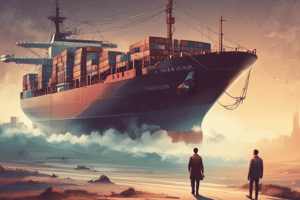Podcast
Questions and Answers
Why is it important to study economics?
Why is it important to study economics?
It helps us understand limitations, challenges, and constraints in life and informs intelligent decision making.
Which of the following are types of goods?
Which of the following are types of goods?
- Surplus Goods
- Free Goods (correct)
- Economic Goods (correct)
- Luxury Goods
Match the following branches of economics with their definitions:
Match the following branches of economics with their definitions:
Microeconomics = Study of small units of the economy Macroeconomics = Behavior of the entire economy
What is opportunity cost?
What is opportunity cost?
What does the Greek word 'oikos' mean?
What does the Greek word 'oikos' mean?
Define trade-off.
Define trade-off.
What is one of the basic economic problems?
What is one of the basic economic problems?
Why is it important to study economics?
Why is it important to study economics?
What are the two types of goods?
What are the two types of goods?
Match the branches of economics:
Match the branches of economics:
Opportunity cost refers to the value of the alternative given up to obtain another item.
Opportunity cost refers to the value of the alternative given up to obtain another item.
What is a trade-off?
What is a trade-off?
The Greek word 'oikos' means _____ and 'nomos' means _____ in relation to economics.
The Greek word 'oikos' means _____ and 'nomos' means _____ in relation to economics.
The basic economic problem involves _____ and _____.
The basic economic problem involves _____ and _____.
Flashcards are hidden until you start studying
Study Notes
Introduction to Economics
- Economics studies how to make choices with limited resources to satisfy unlimited wants and needs.
- Economics is the art of decision-making, using the scientific method to understand problems, make assumptions, gather data, analyze, and draw conclusions.
Two Types of Goods
- Economic goods have value or price.
- Free goods are obtained naturally without cost.
Two Branches of Economics
- Microeconomics focuses on individual behavior, like consumers, producers, and market transactions.
- Macroeconomics focuses on the entire economy, including government, industry, and household activities.
The Importance of Studying Economics
- Studying economics helps students develop intelligent decision-making skills, especially in the face of limitations and constraints.
Economic Choices: Individual and Social
- Individual choices are made to satisfy personal needs and wants.
- Social choices are made by the government to satisfy the needs of society as a whole.
Opportunity Cost
- Opportunity cost is the value of the alternative given up when choosing something else.
- It represents the "what you miss out on" when making a decision.
Trade-offs
- Trade-offs involve sacrificing one option to gain another, often involving weighing the benefits and costs.
- They allow us to prioritize options and make choices based on what we value most.
Basic Economic Problem
- Production focuses on what to produce and how much given limited resources.
- Distribution focuses on how to allocate and distribute the produced goods and services among the population.
Economics
- The science of making choices
- The study of human behavior to satisfy unlimited needs and wants using limited resources.
Types of Goods
- Economic Goods - Have value or price
- Free Goods - Obtained free in natural form
Branches of Economics
- Microeconomics - Focuses on studying the small unit of the economy, such as the individual behavior of consumers, producers, and the market. It studies products and services for both consumers and producers.
- Macroeconomics - Focuses on the behavior of the entire economy, including aggregate activities of the government, industry, and households.
What Will You Learn by Studying Economics?
- Develop intelligent decision making skills
Scientific Method in Economics
- Identify Problems
- Formulate assumptions or hypotheses
- Gather data and information
- Test hypotheses and analyze data
- Draw conclusions and make recommendations
Types of Choices
- Individual choices – Satisfying own needs and wants
- Social choices - Made by the government to satisfy the needs of society
Opportunity Cost
- Refers to the value of the alternative given up when obtaining another item
- The value of what you didn't choose
- Example: You choose to play a video game instead of watching TV, the opportunity cost is the TV show you didn’t watch.
Trade-off
- Involves sacrificing one product for another
- You choose between two or more options
- Example: You choose to study instead of hanging out with friends, the trade-off is better grades but less social time.
Basic Economic Problems
- Production: How to best allocate resources to produce products and services
- Distribution: Who gets what share of the goods and services produced
Opportunity Cost vs. Trade-off
- Trade-off is about choosing between two or more options.
- Opportunity cost is the value of what you didn't choose.
Studying That Suits You
Use AI to generate personalized quizzes and flashcards to suit your learning preferences.




